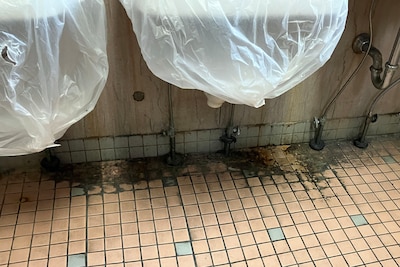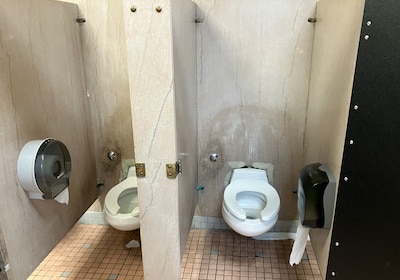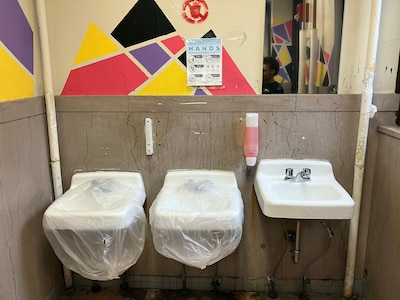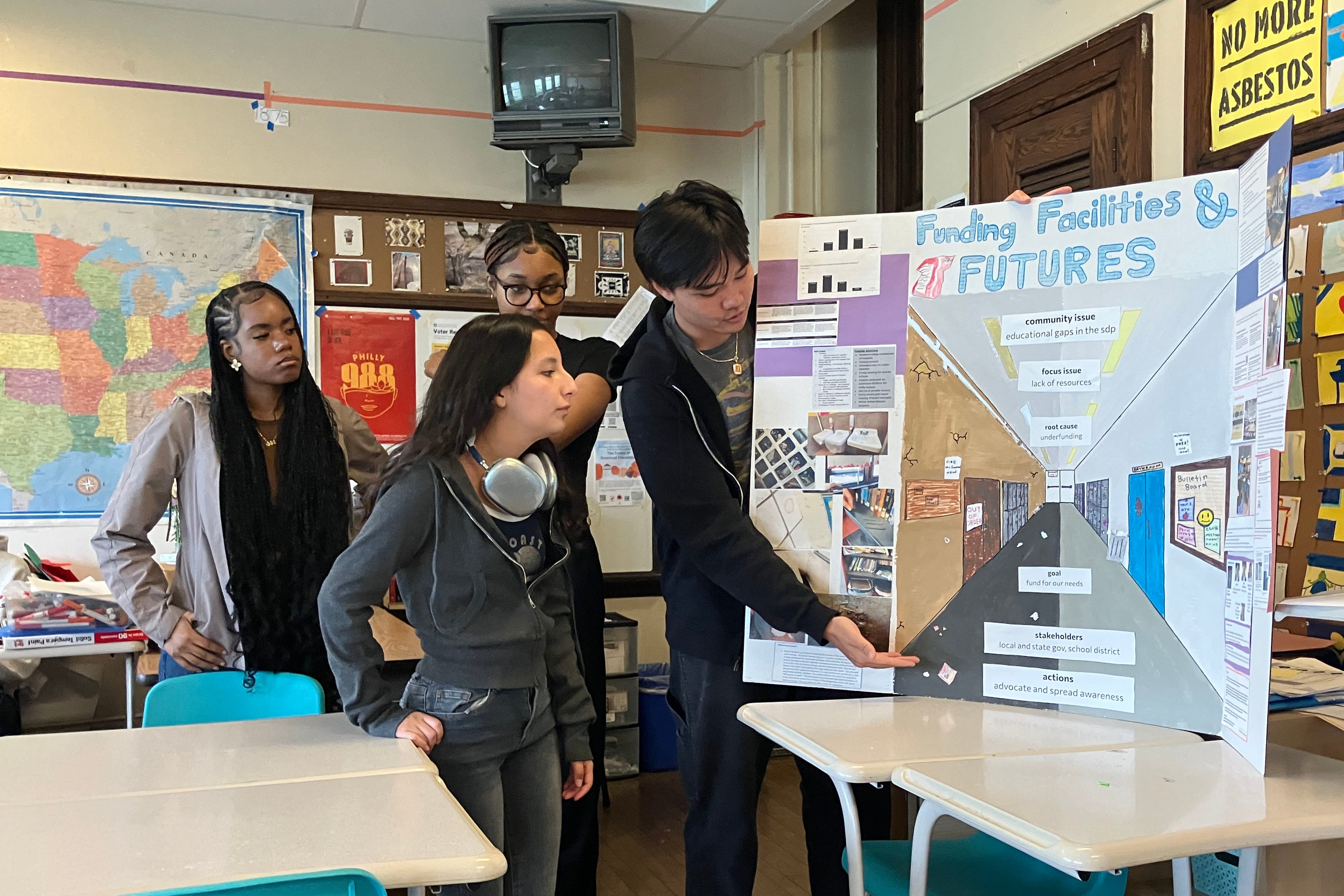Sign up for Chalkbeat Philadelphia’s free newsletter to keep up with news on the city’s public school system.
A group of seniors at the Academy at Palumbo High School in South Philly was so fed up with their deteriorating building that they decided to investigate.
They started documenting their “grimy” unusable bathrooms, the stifling heat and humidity in the gym and lunchroom, the peeling paint, rodent sightings, and mysterious liquid dripping from classroom ceilings.
They also documented what their peers around the city thought. As part of advocacy group Generation Citizen’s civics day earlier this month, the Palumbo students surveyed their classmates and students across the district asking for their experience with school conditions. What they found disappointed them: More than 77% of the 200 respondents said they noticed maintenance issues at their schools, and nearly 68% rated the conditions of their bathrooms a two out of five — or worse.
Such responses were consistent across schools, they said, including at coveted magnets like Central High School. The students said they intend to bring these concerns to the district and school board at their action meeting on Thursday.

The district is undergoing a facilities planning process to overhaul its buildings with the hope of improving some of these conditions for students in the years to come. But that process isn’t moving fast enough for the thousands of Philly students who say their learning conditions now aren’t setting them up for academic success.
Palumbo’s building was constructed in 1930, and the students there now said they can tell.
Student Kimora Kelly said it makes her “miserable” to feel like their building isn’t receiving appropriate funding, resources, and care.
“We see our school, and then compare [it to] other suburban schools. Their schools are so much cleaner, look more fresh. It looks like a better environment to actually learn,” Palumbo senior Kian Lieu told Chalkbeat.
Lieu’s cousin attends one of those suburban schools where “the paint is white instead of yellow,” he said.
“This environment doesn’t make you want to come to school,” Lieu said. “We are grateful for what we have, but you know, things can always be better.”
Philly students, educators, and school staff have been telling the district about their poor bathroom conditions and insufficient ventilation, heating, and cooling for years. The average age of a Philly public school building is around 73 years old. But some, like Palumbo, have been around for nearly a century or longer.
At several student-focused community meetings this past winter, young people told district officials about dirty bathrooms, rats, overcrowding, and a general feeling of neglect.
“A lot of the people who are responsible for our buildings haven’t been in one,” or spent sufficient time in them like the students and staff have, said Palumbo student Gretta Rogan. “We joke about inviting [elected officials] here and giving them lots of water and then letting them see the bathrooms for themselves.”

As of 2023, there were some 2,000 bathrooms spread across Philadelphia’s 218 district school buildings, yet the district only employed eight plumbers, according to district data. In the 2022-23 school year, district officials told school board members that it takes some 50 days for bathroom repairs to be completed.
According to district spokesperson Christina Clark, the district now employs 10 plumbers in addition to outside contractors.
Clark said in an email that the district launched a “restroom task force” in January and will report data from that task force in July. She also said officials have “streamlined the work order process” and improved internal forms and systems to “ensure faster response times.”
“Preliminary data from the current school year shows that repair timelines have improved, with average turnaround times decreasing in many schools,” Clark said. “We continue to monitor progress closely and are committed to both improving infrastructure and communicating more clearly with our school communities about timelines and expectations. We are determined to provide our students with clean, safe, and functional spaces.”
Student waits to leave school before using bathroom
On the day Chalkbeat visited Palumbo in April, several bathroom sinks were out of order, and while most stalls had some toilet paper, “most of the time they don’t,” Kelly said. The doors don’t consistently close or lock and long waiting lines between classes can make students late.
“I just wait until I go home to use the bathroom” Kelly said.

The second floor gym has a different problem. “You have no air, the windows don’t open, so you’re just sitting there sweating in this hot room” Kelly said. “With no air, what am I supposed to do? Just pass out?”
For their investigation, the Palumbo seniors also spoke with a member of their custodial staff who told them cleaning supplies and toilet paper are often in short supply. While they try their best to keep the school clean, janitorial workers told the students there’s only so much they can do without closing the school entirely to upgrade bathrooms and fix electrical issues.
What their schools and the district need is more funding and better systems to allocate it, the students said. A Commonwealth Court Judge ruled in 2023 that Pennsylvania’s school funding process was unconstitutional, shortchanging districts like Philly and exacerbating many of these building challenges.
As the city and state continue to shape their budgets this summer, Palumbo students said adding funding for school facilities is nonnegotiable.
Without repairs, the decrepit building conditions will continue to affect the way students feel about their schools, their ability to learn, and could even drive enrollment down, the Palumbo students said.
A few months ago, student Kayla Howard said Palumbo — which is a selective admissions magnet school — hosted an open house to court prospective families.
Seeing their faces as they took in the “dirty, dull” floors and walls, Howard said, was “sort of embarrassing for our image, and also just our reputation as a whole.”
The Palumbo students said as part of their project, they wanted to think about possible solutions. They highlighted the city’s Whole Home Repair program which provides funding to low-income homeowners to fix roofs, electrical systems, heating and cooling issues, and more.
Could something like that work for schools? The students think it could be worth a shot.
“We have the bare essentials to be in a school,” student Emily Alava said, “but the effort isn’t put there to make us enjoy being in school.”
This story has been updated to include a response from the School District of Philadelphia.
Carly Sitrin is the bureau chief for Chalkbeat Philadelphia. Contact Carly at csitrin@chalkbeat.org.






